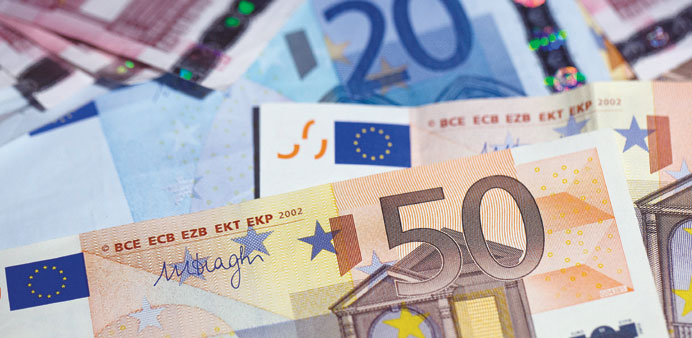Euro banknotes of various denominations are arranged for a photograph in London. The euro is emerging as a favoured refuge for investors’ cash.
Bloomberg/London
The shakeout in global markets is sending currency traders back to basics.
All five of the major currencies to have strengthened against the dollar in the past month - from the euro and yen to Sweden’s krona - are from economies that enjoy a surplus in their current accounts, or broadest measures of trade.
Analysts say that’s the key quality making these currencies the best havens from the turmoil pummelling global markets.
The focus on countries’ balance of payments is reminiscent of the late 1990s and early 2000s, before cheap money and interest-rate differentials came to dominate foreign-exchange markets.
“In times of expansion and risk seeking, current-account surpluses or savings are not always seen as a virtue,” said Stephen Jen, London-based managing partner at SLJ Macro Partners and a former International Monetary Fund economist.
“But in contraction and risk aversion, it’s seen as a factor that helps determine how good an asset might be as a safe haven.”
The strength of the trend is underlined by the euro’s 2.7% advance against the dollar over the past month.
Europe’s shared currency isn’t a traditional haven. Yet, backed by a first-quarter current-account surplus equivalent to 2.3% of the economy - the largest since its 1999 debut - - the euro is emerging as a favoured refuge for investors’ cash.
For Paresh Upadhyaya of Pioneer Investment Management it’s like going back to the end of the last century.
“It’s no longer the model of the 2000s, where a rising tide lifts all boats,” said the company’s Boston-based director of currency strategy.
“Investors will have to be more discriminating. The countries that have strong current-account dynamics will minimize chances of having shocks to the system.”
Current-account balances have long been lacking from narratives in the foreign-exchange market driven by unprecedented monetary easing and speculation about when major central banks, particularly the Federal Reserve, will tighten policy.
That’s starting to change as investors favour currencies already propped up by net inflows from trade. Countries with surpluses tend to face appreciation pressures as local exporters repatriate incomes earned from abroad.
This return to the more basic tenets of foreign exchange follows August’s stock-market rout, which wiped $5tn from global shares and sent an index of emerging-market currencies to a two-decade low amid signs China’s economy is slowing.
“It’s risk reduction most of all,” said Jane Foley, a senior currency strategist at Rabobank in London. “I don’t think investors are actively buying them to go long. But during the risk-aversion period, their current-account surplus is a positive factor.”
A long position is a bet a currency will strengthen.
The yen, which surged 3.4% against the dollar in the past month, is regaining its haven status as its current-account surplus reaches an almost four-year high.
Surpluses of more than 6% for Sweden and Denmark helped the krona and krone strengthen 2.2% and 2.7%. And completing the winning group is Switzerland’s franc, which eked out a 0.3% gain versus the US currency from its 7.8% surplus.
Not every nation with a current-account surplus has a currency that’s outperforming.
Norway’s krone came within 0.2% of a 13-year low against the dollar last week as tumbling oil prices outweighed the surplus of western Europe’s biggest crude producer. Singapore’s dollar lost 3% because of its ties with China, even though its surplus is equal to about a fifth of the economy.
Some investors don’t buy the connection between current accounts and asset performance.Ken Dickson, the Edinburgh-based investment director for currencies at Standard Life Investments, which oversees about $380bn, called the link “spurious,” and said the gains may simply be down to investors unwinding riskier trades funded in euros and yen.
JPMorgan says the link is real and predicts worsening market turmoil will mean traders will continue to pay more attention to a nation’s trade balance.
“Deficit countries’ currencies struggle in a rising- volatility environment and surplus currencies do well,” said London-based currency strategist Paul Meggyesi. “It doesn’t matter until it matters.”

